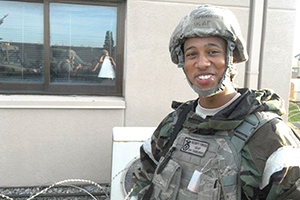Lee Tamburro's seven years as a security officer in the Air Force took him to Afghanistan and Germany, Russia and Japan. It was satisfying, well-defined work.
Life back home in Pittsburgh wasn't so clear.
"Civilian life seemed harder than military life," said Tamburro, 25, who was discharged in March. "I wasn't on base anymore. Nobody was telling me what to do. No set bedtime or when to get up. I found myself not wanting to do anything. I knew there were things I should do, but nothing lit a fire under me."
He found inspiration and help through PAServes: Greater Pittsburgh, a new agency that coordinates the needs of veterans with the varied offerings from nearly 40 independent organizations. Pittsburgh Mercy Health System manages the program with a $300,000 grant from The Heinz Endowments, a philanthropy funded by the ketchup fortune.

Lee Tamburro of Pittsburgh on duty at a guard station at Osan Air Base in South Korea. An assistance center for veterans managed by Pittsburgh Mercy Health System helped Tamburro with his return to civilian life.
PAServes: Greater Pittsburgh is the third such local agency funded by The Heinz Endowments with the guidance of the Syracuse University Institute for Veterans and Military Families. The first, NYCServes, opened in New York in 2014. The goal is to establish more of them across the country.
The grant pays for four Pittsburgh Mercy employees who staff the local PAServes agency near downtown. It also covers costs of the system for keeping track of veterans' requests and services rendered.
Tamburro went to a few meetings of a veterans support group and heard about PAServes: Greater Pittsburgh. He called and spoke with David Roudabush, one of its intake specialists and a former Pennsylvania Army National Guard engineer. Tamburro now has an apartment and began classes this fall at Robert Morris University in suburban Pittsburgh.
"Dave helped me a lot," Tamburro said. "We put a list together of things I needed to do and we tackled that list. He got me in touch with colleges. He even let me use his computer. It's comforting to talk to someone who has been through similar experiences. Other people may not understand, but another veteran does."
Roudabush calls Tamburro occasionally to keep in touch — and to keep track of his progress.
Jean Coyne, who oversees the program for Pittsburgh Mercy, said a key goal is to monitor the services provided to veterans. The office records dates of requests, services offered and follow through.
"A lot of agencies offer help of one sort or another. Veterans call an agency and ask for something they don't provide," said Coyne, director of PAServes: Greater Pittsburgh. "You can pass along a request and never know whether anything happened, or even hear back."
She became acquainted with that lack of coordination while working with veterans at the Allegheny County Jail in Pittsburgh as a staff member of Pittsburgh Mercy, where she also is director of intervention services. Through PAServes: Greater Pittsburgh, participating agencies route requests through a central office that matches veterans' needs with services, be that legal advice, help with housing, assistance resolving trouble with the Department of Veterans Services, financial assistance, or locating opportunities for sports and physical fitness.
Tamburro went to the office several times and met Roudabush, but Coyne said most veterans interact with the program through phone, email or other social media. Since PAServes: Greater Pittsburgh opened in September 2015, it has coordinated and tracked the needs of 852 veterans with a total of 1,437 requests for help. And the program is growing — Coyne said it worked with 130 veterans in August.
The grant runs for two years. She said Pittsburgh Mercy, which applied to manage the service, is seeking other funding sources to continue it.
Coyne said veterans of the Vietnam War era constitute the largest number of people seeking assistance, followed by veterans who served after the Sept. 11, 2001, terrorist attacks. She said about 140,000 veterans live in the three-county area of greater Pittsburgh that the program serves.
In announcing the grant, The Heinz Endowments said it wanted to help veterans negotiate the "tangle of bureaucracy" of well-intended but independent service organizations. Ben Stahl, director of the Veterans Leadership Program of Western Pennsylvania, said PAServes: Greater Pittsburgh also inhibits "scope creep, or the potential for organizations to step into other missions.
"Now each of the organizations knows what its mission is, be it mental health or housing or legal assistance," Stahl said. "If somebody comes in and needs a certain kind of help, we can leave it to the group that specializes in that."
Stahl's program specializes in housing and employment and was founded in 1982. Stahl, who was in the Navy during the second Gulf War, said PAServes: Greater Pittsburgh provides "a mechanism for coordination, a portal. It gets the message to the right group, starts the clock and follows up. It's something that was lacking before, and it's the best thing for the veterans."
Copyright © 2016 by the Catholic Health Association
of the United States
For reprint permission, contact Betty Crosby or call (314) 253-3477.